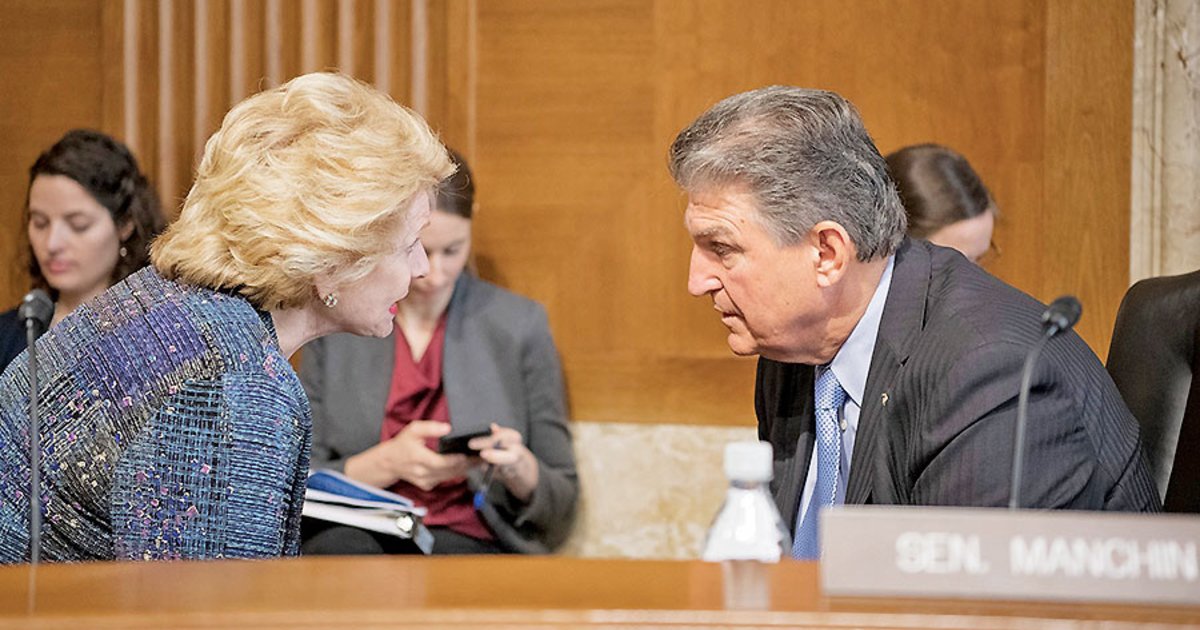
WASHINGTON — Sen. Joe Manchin reportedly told Democratic leaders Thursday that he won’t support an economic package that includes new climate spending or tax increases for corporations and the wealthy, potentially hindering automakers’ hopes for an enhanced electric vehicle tax credit.
Manchin, a conservative Democrat from coal-producing West Virginia and a key swing vote, has been negotiating a narrower budget reconciliation package after blocking a larger $2 trillion plan last year. The legislation cannot pass in the evenly split Senate without Manchin since Democrats need a simple majority vote, or 50 senators plus the vice president.
The Washington Post first reported the news late Thursday, noting that Manchin is instead open to certain provisions to lower prescription drug prices and extend subsidies under the Affordable Care Act.
“Political headlines are of no value to the millions of Americans struggling to afford groceries and gas as inflation soars to 9.1 percent,” said Sam Runyon, a spokeswoman for Manchin. “Sen. Manchin believes it’s time for leaders to put political agendas aside, reevaluate and adjust to the economic realities the country faces to avoid taking steps that add fuel to the inflation fire.”
Runyon did not comment on whether Manchin will support an updated or expanded EV tax credit. However, the senator in April questioned the need for the credit, given strong consumer demand and an ongoing reliance on China for battery components.
“It makes no sense to me whatsoever,” Manchin said at the time. “When we can’t produce enough product for the people that want it, and we’re still going to pay them to take it. It’s absolutely ludicrous in my mind.”
The latest news dampens President Joe Biden‘s Build Back Better agenda — a centerpiece of his economic and climate plans that could help prop up the president’s goal for half of all new vehicles sold in the U.S. to be zero emission by 2030, as well as having a carbon pollution-free power sector by 2035 and net-zero emissions by 2050.
The White House did not immediately respond to a request from Automotive News for comment.
The Democrats’ budget reconciliation bill at one point included a controversial EV tax credit proposal that would have given consumers as much as $12,500 for EVs assembled in a factory represented by a labor union with U.S.-produced batteries.
In June, Manchin said the $4,500 bonus for union-built EVs — a provision opposed by Manchin as well as major automakers including Toyota and prominent industry groups — had been scrapped. Toyota’s manufacturing plant in Manchin’s home state is its only combined engine and transmission factory in North America.
In a statement, Rep. Debbie Dingell, D-Michigan, said, “Almost one year ago, labor, environmental advocates and the auto industry stood together at the White House with the president to announce a historic, ambitious goal to reduce carbon emissions across the transportation sector and save our environment.
“To accomplish that goal, we need to enact policies and take real action immediately. Not acting this year on advancing meaningful climate investments means failing our workers, our domestic businesses, our environment, and American leadership,” she continued. “To be blunt, it will cost jobs and lives.”
Dingell previously has warned that EVs are “not affordable to too many Americans,” and that consumer incentives — such as the current $7,500 tax credit — have helped make EVs more affordable.
“Combatting climate change and solidifying our standing as an economic superpower should not be House vs. Senate issues or Republican vs. Democratic issues,” she said “because more than anything else, they are American issues which demand real action by those of us elected to serve.”
Sen. Debbie Stabenow, a Michigan Democrat who spearheaded the union-bonus EV tax credit proposal, said if the reports are true, it would be “a gift to China” and would hurt American businesses and workers.
“This short-sighted position shows a complete lack of understanding about our American auto industry and its leading role in the future of manufacturing in our country. … This missed opportunity cannot be overstated. We are handing over the keys to China and giving them the green light to lead the clean energy future,” Stabenow said in a statement.
Meanwhile, General Motors, Ford Motor Co., Stellantis and Toyota have jointly urged congressional leaders to lift the 200,000-vehicle-per-automaker cap on the current $7,500 tax credit for consumers buying eligible EVs. GM, Tesla and Toyota have reached the threshold.
“Recent economic pressures and supply chain constraints are increasing the cost of manufacturing electrified vehicles which, in turn, puts pressure on the price to consumers,” they wrote in June.
Automotive News has reached out to those automakers for comment.